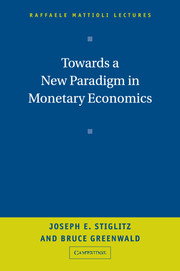Book contents
- Frontmatter
- Contents
- List of figures and table
- The Raffaele Mattioli Lectures
- Preface
- Part I The principles of the new paradigm
- Part II Applications of the new paradigm
- 8 Monetary policy
- 9 Regulatory policy and the new paradigm
- 10 Financial market liberalization
- 11 Restructuring the banking sector
- 12 Regional downturns and development and monetary policy
- 13 The East Asia crisis
- 14 The 1991 US recession and the recovery
- 15 The new paradigm and the “new economy”
- 16 Concluding remarks
- Bibliography
- Index
11 - Restructuring the banking sector
Published online by Cambridge University Press: 12 May 2010
- Frontmatter
- Contents
- List of figures and table
- The Raffaele Mattioli Lectures
- Preface
- Part I The principles of the new paradigm
- Part II Applications of the new paradigm
- 8 Monetary policy
- 9 Regulatory policy and the new paradigm
- 10 Financial market liberalization
- 11 Restructuring the banking sector
- 12 Regional downturns and development and monetary policy
- 13 The East Asia crisis
- 14 The 1991 US recession and the recovery
- 15 The new paradigm and the “new economy”
- 16 Concluding remarks
- Bibliography
- Index
Summary
All too often, countries faced the difficult task of restructuring their banking sector. Mounting non–performing loans result in liabilities in excess of assets; banks cannot fulfill their promise to their depositors, let alone continue to perform their central role in providing credit. Inevitably, the recriminations –against politicians who have allowed lax regulation, possibly under the influence of corruption, and pursued misguided macro–economic and structural policies – are followed by bailouts and bank closures, accompanied by high–minded speeches about never allowing such a state of affairs to arise again. Occasionally, a natural citizen outrage at the very notion of bail–outs has slowed down the process; but the countries that have postponed the bail–out, such as Japan, have suffered, as the contraction of credit inevitably has led to contraction of the economy, or at least stagnation.
Unfortunately, many of the doctors that have been called in to nurse the banking sector back to health have too little understanding either of the role of finance and credit in the economy or of the micro–economic foundations of banking. Thus, all too often, the prescription of the visiting medics entails the following recipe: first, a triage – dividing the banks into three categories, those that are healthy, those that are so sick that they should simply be shut down, and those in between, where a good dose of new equity would restore the patient to health. “Health” is typically measured by the extent to which the bank meets the capital adequacy requirements.
- Type
- Chapter
- Information
- Towards a New Paradigm in Monetary Economics , pp. 239 - 250Publisher: Cambridge University PressPrint publication year: 2003
- 6
- Cited by

